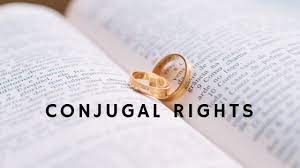Conjugal Rights:

A petition challenging the provision allowing restitution (recovery) of conjugal rights under Hindu personal laws (Hindu Marriage act 1955).has been pending in the Supreme Court (SC) for months without a hearing.
- The petition, titled Ojaswa Pathak vs Union of India, was filed in the SC in February 2019. The case was last heard in July 2021.
- Conjugal rights are rights created by marriage, i.e. right of the husband or the wife to the society of the other spouse.
- The law recognises these rights— both in personal laws dealing with marriage, divorce etc, and in criminal law requiring payment of maintenance and alimony to a spouse.
- Section 9 of the Hindu Marriage Act 1955 and Section 22 of the Special Marriage Act 1954 empower a husband or a wife to move the local district court, complaining that the other partner has “withdrawn” from the marriage without a “reasonable cause”.
- The concept of restitution of conjugal rights is codified in Hindu personal law now, but has colonial origins.
- Originating from Jewish law, the provision for restitution of conjugal rights reached India and other common law countries through British Rule.
- The British law treated wives as their husband’s personal possession hence they were not allowed to leave their husbands.
- Similar provisions exist in Muslim personal law as well as the Divorce Act, 1869, which governs Christian family law.
- Incidentally, in 1970, the U.K repealed the law on restitution of conjugal rights.




